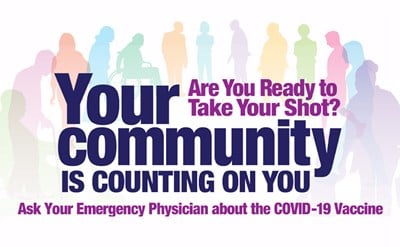WASHINGTON, D.C.—The American College of Emergency Physicians (ACEP) urges policymakers to address the nation’s boarding crisis, reduce excessive delays in care, and prevent avoidable clinical complications, especially for patients with mental health conditions.
When all or part of a hospital reaches capacity, patients may remain in the emergency department, even after being seen and treated by an emergency physician. This patient “boarding” can leave anyone waiting for days, weeks, or even months, to get the care they need in other parts of the hospital or to be transferred to another appropriate facility.
“The boarding crisis affects everyone who seeks emergency care, but patients with mental health needs are especially at risk,” said Christopher S. Kang, MD, FACEP, president of ACEP. “Excessive delays that result from boarding can worsen a patient’s condition and lower the quality of care. Health care decisionmakers and policymakers can do more to recognize the urgency of the boarding crisis; meaningful actions are long overdue and needed now to prevent avoidable patient harm.”
Significant gaps in mental health care are a major driver of the boarding crisis. Many patients with mental health emergencies have limited options for acute or sustained care beyond the emergency department. On average, patients with mental health care needs wait three times longer for care than other patients.
To help address these challenges, ACEP strongly supports the bipartisan “Improving Mental Health Access from the Emergency Department Act,” as a next step needed to provide critical funding to help communities implement and expand the programs that work best for them.
Boarding affects all patients in the emergency department, including those who have been evaluated and those waiting for care. The crisis stems from a multitude of factors that span the entire health care system at a scale beyond any individual emergency physician, emergency department, or single hospital.
To illustrate the severity of the boarding crisis, the American College of Emergency Physicians (ACEP) collected more than 140 poignant stories directly from emergency physicians across the country.
When emergency department beds are occupied with boarding patients, emergency care teams sometimes have no choice but to start evaluating and treating patients in hallways or even the waiting room.
“Emergency physicians are doing their best to safely care for all of their patients while boarding creates and magnifies dangerous conditions for everyone who relies on emergency care,” said Dr. Kang.
ACEP urges the Biden Administration to convene a summit of stakeholders to address this crisis, and supports the bipartisan Congressional call for the Department of Health and Human Services to establish a boarding task force with broad stakeholder representation so that immediate and long-term solutions can be identified and implemented.
“There’s no simple single solution to the boarding crisis, but we can, and we must, start by promptly focusing attention on this issue, including prioritization of mental health care,” said Dr. Kang. “Thoughtful and well-resourced collaboration at the local, state, and national levels can reduce the dangerous practice of boarding and expand treatment options for vulnerable patients.”
###
 American College of Emergency Physicians
American College of Emergency Physicians







